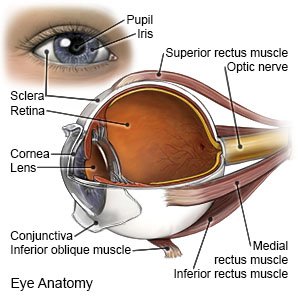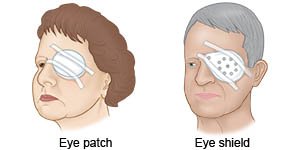LASIK (Laser in Situ Keratomileusis)
Medically reviewed by Drugs.com. Last updated on Aug 4, 2025.
AMBULATORY CARE:
What you need to know about laser in situ keratomileusis (LASIK):
LASIK is laser surgery to correct refractive errors of the eye. Refractive errors are common eye disorders that cause blurred vision. These errors happen when there is a problem in the refraction (bending) of light in the eye. They are often caused by an abnormal shape and texture of the cornea. The cornea is the clear outer layer of your eye. LASIK may improve the vision in one or both of your eyes.
 |
How to prepare for surgery:
- Your healthcare provider will tell you how to prepare for surgery. Arrange to have someone drive you home after surgery and stay with you for a few hours. You may be groggy or sleepy for several hours after surgery. It is important to have someone available to help you and watch for problems that need immediate care.
- Do not wear eye makeup, lotion, or hairspray on the day of your surgery.
- You may need to stop wearing contact lenses 1 week to 3 months before your surgery. This depends on the kind of contact lenses you wear and how long you have been wearing them. Your healthcare provider will tell you when to stop wearing your contact lenses.
- Your healthcare provider may give you medicine to help you stay calm and relaxed during surgery. Tell the provider if you have ever had an allergic reaction to anesthesia or numbing medicine.
What will happen during surgery:
- You will be given eye drops to numb your eyes so you do not feel pain. A tool called a speculum will hold your lids apart so you cannot blink during surgery. A small suction ring will be placed on your cornea. Pressure from the suction ring will cause your vision to fade and become black. A cutting tool will move along the track of the suction ring. It will cut a small, hinged cap or flap on your cornea.
- The flap will be folded over. The area under the flap will be gently cleaned and examined. The laser will be placed over your eye so it can reshape the uncovered layer of the cornea. The flap will be put back in its normal place. The cornea begins to heal almost as soon as the flap is moved back.
What will happen after surgery:
You may be taken to a recovery room. The eye doctor will watch your eyes closely to make sure the flap does not move or wrinkle. Your eyes may feel gritty or itchy the first few days. They may be sensitive to light, watery, or painful. You may have redness on the whites of your eye. Your vision may seem hazy. You may see halos or glare around lights. It may be hard to see at night. These problems usually improve as time passes.
Risks of surgery:
You may have eye damage or develop an infection. Your vision may be worse than before surgery. You may still need to use reading glasses. Your vision may get worse again over time. Eye problems such as halos or dry eye may be permanent. You may also develop double vision, eye sores, glaucoma, cataracts, or retinal detachment.
Seek care immediately if:
- You cannot see at all.
Contact your healthcare provider if:
- You have a fever.
- Your eyes are red, swollen, and draining pus.
- You have eye pain that does not go away, even with treatment.
- Your vision becomes worse all of a sudden.
- You have questions or concerns about your condition or care.
Medicines:
It is very important that you use the following eyedrops as directed. You may need to continue using them daily for weeks or months.
- Antibiotic eyedrops help prevent an infection caused by bacteria.
- Steroid eyedrops help decrease eye inflammation.
- Take your medicine as directed. Contact your healthcare provider if you think your medicine is not helping or if you have side effects. Tell your provider if you are allergic to any medicine. Keep a list of the medicines, vitamins, and herbs you take. Include the amounts, and when and why you take them. Bring the list or the pill bottles to follow-up visits. Carry your medicine list with you in case of an emergency.
Follow up with your healthcare provider as directed:
You may need to return to have your eyes checked. Write down your questions so you remember to ask them during your visits.
Eye care:
- Do not rub your eyes for at least 3 months. Rubbing your eyes can move or damage the flaps.
- Rest your eyes. Use your eye shield, eye patch, or corrective lenses as directed. Get plenty of sleep. Limit activities that strain your eyes, such as reading.

- Use lubricating eyedrops as directed. You will need to use drops that do not contain preservatives at first. Your eye specialist will tell you how long to use preservative-free drops. Talk to your provider if dry eye continues for longer than the first week after surgery.
- Ask about activity. You may need to avoid exercise and contact sports. Do not swim, sit in a hot tub, fly, or scuba dive until your healthcare provider says it is okay. These activities increase the pressure in your eyes. Ask when you can start to wear makeup.
- Use proper lighting. This will help you see more clearly. Use lights that decrease glare in your home or workplace.
- Wear sunglasses outside. This will help protect your eyes and decrease sensitivity to light.
© Copyright Merative 2025 Information is for End User's use only and may not be sold, redistributed or otherwise used for commercial purposes.
The above information is an educational aid only. It is not intended as medical advice for individual conditions or treatments. Talk to your doctor, nurse or pharmacist before following any medical regimen to see if it is safe and effective for you.
Further information
Always consult your healthcare provider to ensure the information displayed on this page applies to your personal circumstances.
